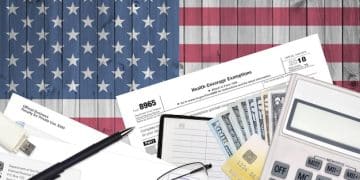Personal Finance Tips for Freelancers: Master Income & Expenses

Personal finance tips for freelancers encompass strategic budgeting, tax planning, and efficient expense management to ensure financial stability and growth in the fluctuating freelance market, crucial for thriving in the US landscape.
Navigating the world of freelancing offers immense freedom and flexibility, but it also presents unique financial challenges. Mastering personal finance tips for freelancers: managing income and expenses is crucial for long-term stability and success.
Personal Budgeting for Freelancers
Budgeting is the cornerstone of financial stability, especially for freelancers with fluctuating income. A well-structured budget will help you allocate your resources effectively, ensuring you cover essential expenses and save for future goals. Let’s break down how to get started.
Track Your Income and Expenses
The first step in creating a budget is understanding where your money comes from and where it goes. This involves meticulously tracking all income sources and expenses. This awareness will provide valuable insights into your spending habits.
Categorize Your Expenses
Once you’ve tracked your expenses, categorize them into fixed and variable costs. Fixed expenses are consistent each month (rent, utilities), while variable expenses fluctuate (groceries, entertainment). This categorization helps you identify areas where you can potentially cut back.
- Use Budgeting Apps: Explore budgeting apps like Mint or YNAB (You Need A Budget) to automate tracking and categorization.
- Create Spreadsheets: If you prefer a hands-on approach, create a spreadsheet to manually record income and expenses.
- Regular Review: Review your budget regularly (weekly or monthly) to ensure you’re staying on track and make adjustments as needed.
By meticulously tracking your income and categorizing your expenses, will empower freelancers to have a better, more effective approach to finance. Regularly look at your income statements for a better scope.
Tax Planning Strategies for Freelancers
Taxes can be a significant burden for freelancers, but with proper planning, you can minimize your tax liabilities and avoid surprises. Understanding estimated taxes and deductions is essential for financial health. Plan ahead and reduce your overall tax burden.

Understanding Estimated Taxes
As a freelancer, you’re responsible for paying estimated taxes quarterly to the IRS. These payments cover income tax and self-employment tax. Failure to pay estimated taxes can result in penalties. Plan accordingly.
Maximize Deductions
Freelancers can deduct various business expenses to reduce their taxable income. Common deductions include expenses for home office, equipment, software, and professional development. Keep thorough records and consult with tax professionals.
- Home Office Deduction: Deduct expenses related to the portion of your home exclusively used for business.
- Business Expenses: Deduct costs for necessary supplies, software, subscriptions, and travel.
- Health Insurance Premiums: Self-employed individuals can often deduct health insurance premiums.
Tax planning does not have to be difficult, it just requires an organised approach to ensure every element is thoroughly accounted for. Stay informed on the latest policies to allow for a streamlined process.
Setting Up a Separate Business Bank Account
Mixing personal and business finances can lead to confusion and complications, especially during tax season. Setting up a separate business bank account is a simple yet effective way to manage your freelance finances and maintain clarity. It will also help when categorising incomings and outgoings.
Ease of Tracking
A dedicated business bank account makes it easier to track your business income and expenses, simplifying bookkeeping and tax preparation. This separation helps you avoid commingling funds and provides a clear picture of your business performance.
- Simplified Bookkeeping: Streamline your bookkeeping processes with a dedicated account.
- Professional Image: Present a more professional image to clients by using a business account for transactions.
- Tax Compliance: Facilitate tax compliance by keeping your business finances separate from personal funds.
Using a separate bank account will make a huge difference when keeping on track with your finances. It allows the user to easily observe business finances in their own sphere which is beneficial for freelancers.
Creating an Emergency Fund
Freelancing often comes with unpredictable income, making an emergency fund crucial for financial security. This fund will act as a safety net during lean months or unexpected expenses. Start saving and establish some form of protection.

How Much to Save
Aim to save at least three to six months’ worth of living expenses in your emergency fund. This will provide a buffer to cover essential bills and prevent you from going into debt during slower periods. It is essential to have a set ammount in mind before you begin.
Where to Keep Your Emergency Fund
Keep your emergency fund in a high-yield savings account or a money market account for easy access and moderate interest. Ensure these accounts are separate from your everyday checking account to avoid impulsive spending.
Having an emergency fund will allow the freelancer to operate with a certain amount of assurance. Peace of mind can make a big difference especially working independently rather than in a corporate setting.
Investing for the Future
While managing immediate finances is essential, planning for the future is equally important. As a freelancer, you’re responsible for your own retirement savings. This makes investing early and consistently vital for a comfortable retirement. It is also beneficial to consider additional streams of income.
Retirement Accounts
Consider opening a SEP IRA or a Solo 401(k) to save for retirement. These accounts offer tax advantages and allow you to contribute a portion of your self-employment income. These strategies will allow you to reduce your costs and keep on track.
Diversify Your Investments
Diversify your investments across various asset classes, such as stocks, bonds, and real estate. This approach reduces risk and enhances long-term returns. Seek advice from financial advisors to align your portfolio with your goals. Having a variety of investments is a smart move for freelancers.
Managing Debt Wisely
Debt can be a significant obstacle to financial freedom, especially for freelancers starting. Develop a strategy to manage and reduce debt effectively. This may involve consolidating debts, negotiating interest rates, or using the debt snowball method.
- Prioritize High-Interest Debt: Focus on paying off high-interest debts first to minimize interest payments.
- Debt Consolidation: Consider consolidating multiple debts into a single loan with a lower interest rate.
- Avoid Taking on New Debt: Be cautious about incurring new debt, especially during uncertain financial periods.
An effective way of managing debt is by carefully planning incomings and outgoings as well as reducing expenses. All elements should be carefully considered to allow the freelancer to operate with peace of mind in the knowledge that they are organised.
| Key Point | Brief Description |
|---|---|
| 📊 Budgeting | Track income and expenses to allocate resources effectively. |
| 💰 Tax Planning | Pay estimated taxes and maximize deductions to minimize liabilities. |
| 🏦 Business Bank Account | Separate personal and business finances for clarity. |
| 🛡️ Emergency Fund | Save 3-6 months of expenses for financial security. |
Frequently Asked Questions
▼
Start by tracking your income and expenses for a month to understand your cash flow. Then, categorize your spending and allocate funds for essential needs, savings, and discretionary spending. Budgeting apps can help automate this process.
▼
Estimated taxes are quarterly payments to the IRS to cover income and self-employment taxes. Use Form 1040-ES to calculate and pay them online, via mail, or through the Electronic Federal Tax Payment System (EFTPS) to avoid penalties.
▼
A separate business bank account simplifies tracking income and expenses for bookkeeping and tax purposes. It also helps maintain a professional image and avoids commingling personal and business funds, reducing confusion.
▼
Aim to save at least three to six months’ worth of living expenses in an emergency fund. This provides a financial cushion to cover unexpected expenses or income gaps, preventing you from going into debt during slower periods.
▼
Suitable retirement accounts for freelancers include SEP IRAs and Solo 401(k)s. These accounts offer tax advantages and allow you to contribute a portion of your self-employment income, helping you save for a secure retirement.
Conclusion
Managing your finances as a freelancer requires diligence and foresight. By implementing these personal finance tips for freelancers: managing income and expenses—budgeting effectively, planning for taxes, establishing a safety net, investing wisely, and managing debt—you can build a stable financial foundation and achieve long-term success and financial peace of mind in your freelance career.





